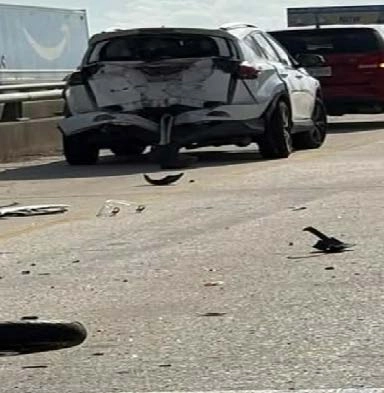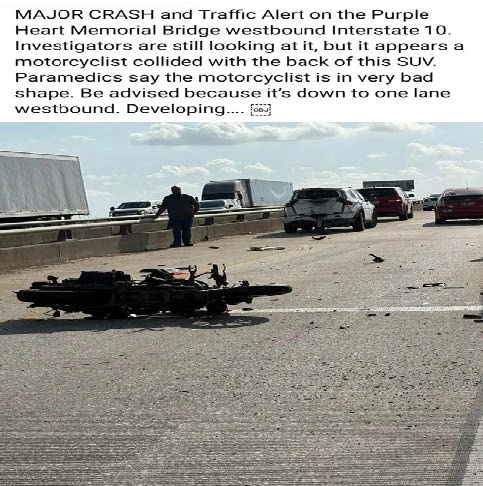
Right Time, Right Skills
By Office of Public Affairs
This is a place holder for subtitle.
For immediate release
Washington, DC - May 23rd was a busy day for Deputy U.S. Marshals Christopher Barton and Seth Howlett, assigned to the Eastern District of Texas – Beaumont Division. After successfully clearing three felony warrants in the morning, they came upon an accident on the Purple Heart Memorial Bridge near Jefferson County, Texas, and noticed traffic had just begun to slow.
As they were driving by, the deputies noticed there was a man lying on the side of the highway with no law enforcement or medical services on the scene. The deputies immediately activated their emergency lights and pulled over to assess the situation.
A motorcycle and SUV had been involved in an accident. After exiting their vehicle and arriving at the motorcycle, the deputies noticed the motorcycle rider was unresponsive and had visible serious injuries, to include severe bleeding from his leg.
“My main goal was to activate my emergency lights and get people away from that area to prevent additional accidents,” Barton said. “And then when we rolled up, clearly he had a compound fracture, so we were able to help.”
“Initially, it appeared that there wasn't much we could do for him; it was pretty bad. You could just tell from looking at him,” Howlett said.
The deputies jumped into action, accessing their modified individual first aid kit and swiftly applying a tourniquet to the upper portion of the rider’s leg that was afflicted with the compound fracture - effectively stopping the bleeding.
As the rider regained consciousness, he was immediately reassured by deputies Barton and Howlett that he was in good hands.
Due to the gridlocked traffic on the bridge because of the accident, the responding emergency medical team was delayed.
“There just wasn't anybody out on the scene. So, we were just trying hold the line until more support arrived,” Barton said. “Thankfully, we were able to help. He's very, very lucky to be alive.”
While Deputy Howlett stayed with the rider, offering continued encouragement, Deputy Barton ran to the ambulance and relayed the critical situation to the EMTs, who rushed a backboard to the injured rider.
Deputies later learned the individual was airlifted from the scene to a level one trauma center and underwent multiple surgeries for two broken legs, two broken arms, a broken collar bone, broken ribs, a broken nose, and a broken pelvis.
“I'm not going to say the tourniquet saved his life, but I am sure he needed every drop of blood to help get himself healed,” Barton said. “I'm just happy for him and his family that he's still around.”
For Barton, years of work with the Bureau of Prisons combined with the USMS training allowed him to act quickly.
“I worked for the Federal Bureau of Prisons for 21 years, responded to a lot of stabbings and serious assaults,” Barton said. “So, there's been times where I’ve had to apply direct pressure to open wounds that are profusely bleeding, conduct CPR chest compressions and things of that nature.”
Both men have responded to accidents or people in distress before, for Howlett, he said his muscle memory from training at the USMS Academy kicked in.
“What they say at the Academy all the time is, ‘You don't rise to the occasion, you fall back to the level of training that you have,’” Howlett said. “We should always set the bar of our training to the highest point possible, so that whenever we get into the stressful situation, it becomes instinctual.”
Howlett joined USMS last year and says there is a responsibility that comes with being a public servant.
“We are public servants at the end of the day, whether we're law enforcement officers, although we don't wear necessarily a uniform or drive a marked police vehicle, we are public servants, and we have a duty to the public to help, to serve, and to protect, and so I take that very seriously,” Howlett said.
For Barton, this dedication to serve is attributed to the fact that everyone is human.
“I would also encourage people not to lose sight of their humanity. Everyone is somebody's family member, right?” Barton said “We're all human first. I don't care who you are, what your pay grade is, we are all human.”
This incident is an example of one of many law enforcement professionals and Deputy U.S. Marshals quietly respond to, day in and day out, serving their communities.


Additional information about the U.S. Marshals Service can be found at https://www.usmarshals.gov.
####
America’s First Federal Law Enforcement Agency

